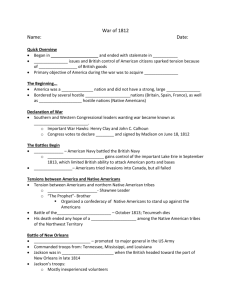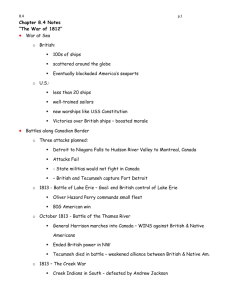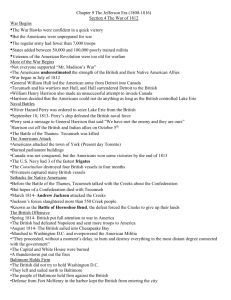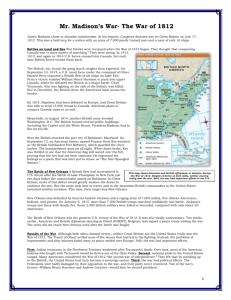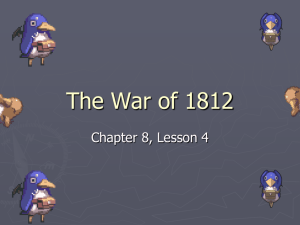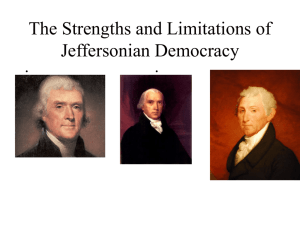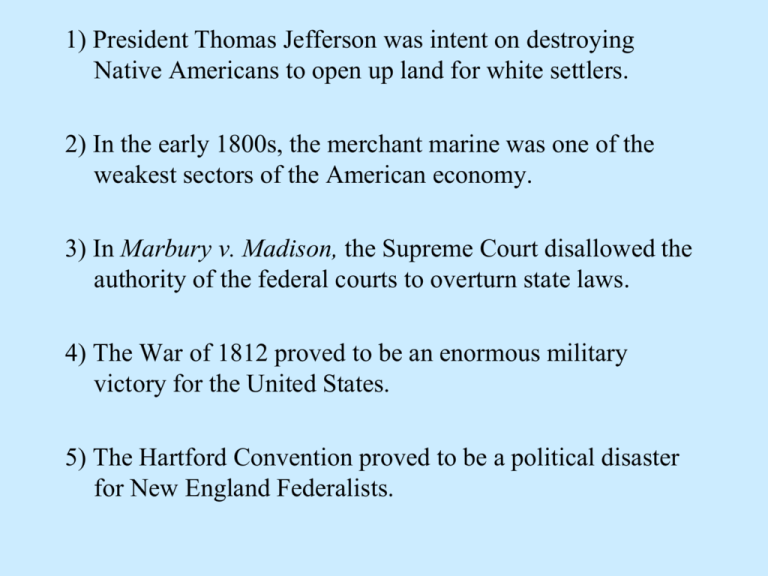
1) President Thomas Jefferson was intent on destroying
Native Americans to open up land for white settlers.
2) In the early 1800s, the merchant marine was one of the
weakest sectors of the American economy.
3) In Marbury v. Madison, the Supreme Court disallowed the
authority of the federal courts to overturn state laws.
4) The War of 1812 proved to be an enormous military
victory for the United States.
5) The Hartford Convention proved to be a political disaster
for New England Federalists.
Madison’s Presidency
• Madison replaces Jefferson, inherits troubles with
England & France
• Non-intercourse Act of 1809 expiring, tried to
play France and GB against each other with
Macon’s Bill no. 2.
• Napoleon calls Madison’s bluff, non-importation
dropped against France, sustained against GB
• US getting pulled into war with GB
Second War for Independence:
War of 1812
•
•
•
•
•
A Bad Idea, Poorly Executed
America has no army, no navy
New England (maritime states) oppose the war
British and Canadians are ready to fight
Americans have no strategy for Canada (forget
the lessons of Montreal in the Fr. & Indian War)
1813 American invasions of Canada fail
Western War Hawks
• 1811: Twelfth Congress moves toward war
• Henry Clay of Kentucky is Speaker of the
House
• Western Reps call for “Free Trade and
Sailor’s Rights,” eagerly eye “free land” in
British Canada
• See British support for Indian threat on
Frontier
Tecumseh and the
Prophet
• Settlers pushing into Kentucky violate sacred hunting grounds of
many tribes
• Tecumseh and the Prophet create a pan-Indian alliance
• Revitalize Indian culture and ways
• Refuse to negotiate or recognize land deals
• Gen. William Henry Harrison destroys Tippecanoe Nov. 7, 1811
• Allies with British in War of 1812
• Tecumseh killed at Battle of Thames, 1813
• Andrew Jackson defeats Creeks at Battle of Horseshoe Bend
• Indian alliance collapses without Tecumseh
WAR!!!
• War Hawks engineer vote for war, 79 to 49 in
House, 19 to 13 in Senate
• Vote shows growing sectionalism (p. 229)
• IRONY: London repealed Orders in Council 2
days before war vote
• New England violently opposed to war with
England - Secession is a real threat.
• US enters the war unnecessarily and un-united
What were the risks and
challenges facing the US during
the war of 1812?
The US Invasions of Canada
• 1812: US intends 3 prong coordinated attack at Detroit, Niagara,
and Lake Champlain. What can go wrong, DOES.
RESULT: US looses many forts on Great Lakes.
• 1813: Oliver Hazard Perry delivers stunning naval victory on
Lake Eire. “We have met the enemy and they are ours.” Victory
changes tide of war in Northwest Territories.
• 1814: US goes on defensive as British troops flow from Europe
following fall of Napoleon. Britain threatens to invade NY down
Hudson. 9/11/1814 Battle near Plattsburgh. Americans slug it
out with British. (Comm. McDonough wins with cable ploy.)
• These naval victories save US from either defeat or
SECESSION!!!
http://library.thinkquest.org/22916/ex1812.html
Battle for Lake Erie
“In short, our victory was due to our
heavy metal.”
-Theodore Roosevelt
• Perry has more ships and more carronades –so he
needs to get close and fight ship to ship.
• His second and command, inexplicably, fails to
engage.
• Perry’s flagship is destroyed and he rows, under
heavy fire to a second, smaller ship. He continues
the fight and the British surrender.
• This puts all the British forts along the Great
Lakes in peril.
http://reed.senate.gov/images/rhodeisland/erie_b.gif
http://www.phmc.state.pa.us/ppet/erie/page1.asp?secid=31
• Oliver Hazard Perry has some success on Lake Erie
• British forced to withdraw from Detroit, leading to
Battle of the Thames Oct. 1813
• British return in 1814, with 4,000 troops
• Washington DC is burned August 1814
• Baltimore is attacked next, important port for privateers
• Ft. McHenry holds, “Star Spangled Banner”
http://library.thinkquest.org/22916/ex1812.html
Washington Burns
• Aug 1814: 4000 British marines arrive with
naval flotilla in Chesapeake Bay.
• US forces routed at Bladensburgh.
• Aug 24, 1814: The Capitol is burned;
Madison and federal government on the run.
• British next attack Baltimore. WHY???
Battle of Baltimore,
http://www.historycentral.com/1812/baltimore.html
Battle for Baltimore
• 9/12/1814: British first attack overland from North
Point (near Key Bridge today).
• MD militia successfully delays British marines. Col.
Ross, their commander is “shot off his horse by two
Baltimore teenagers (Henry McComas and Daniel
Wells.” http://www.pattersonpark.com/Park%20Information/rodgersbastion.html British
withdraw.
• 9/13/1814: 2nd attempt: Battle for Hampstead Hill and
try again. Commodore John Rodgers, USN led 12,000
men in fighting off British, using 100 cannon on site of
Pagoda in Patterson Park today.
• British Navy held at bay by Ft. McHenry and chained
and sunken ships in inner harbor.
• British give up and retreat.
• “Star Spangled Banner”
A hero emerges….
• Andrew Jackson leads Kentucky and
Tennessee militia, along with Indian allies,
in Southern Campaign.
• Wins Battle of Horseshoe Bend
• Wins Battle of New Orleans on Jan 8, 1815
against 8000 veteran British troops with
hodgepodge force of free blacks, militia,
pirates, sailors, Spaniards, and Frenchmen.
• 2000 British soldiers die in 30 minutes.
US casualties are 70.
Jackson at the Battle of New Orleans, artist unknown
• Jackson wins Battle of Horseshoe Bend against the
Creek
• Next fights The Battle of New Orleans, last
campaign of war
•The battle made Andrew Jackson a national hero,
esp. in West and on the frontier.
Treaty of Fort Jackson imposed on Creek nation by Andrew Jackson
Treaty of Fort Jackson imposed on Creek nation by Andrew Jackson
Andrew Jackson imposed the Treaty of Fort Jackson on the Creek nation, ending the campaign
against the Red Sticks. The treaty required the Creeks to pay the costs of the war, which
Jackson estimated as the equivalent of 20 million acres. In moving the Creeks out of what is
now central Alabama, Jackson initiated the Indians' forced removal from the south. Ironically,
of the thirty-five chiefs who made their mark on the treaty, part of which is shown here, only
one was a member of the Creek nation. (National Archives)
Copyright © Houghton Mifflin Company. All rights reserved.
Old Ironsides
Constitution
Guerrière
Tons.
1576
1338
COMPARATIVE FORCE.
Guns. Broad-side.
27
684
25
556
Men.
456
272
Loss.
14
79
http://www.ecst.csuchico.edu/~beej/constguerr.html
The British commander should not
have engaged. He was at a
disadvantage.
The loss of the Guerriere to the
Constitution was a huge humiliation
to Britain. In the last two decades
the British had NEVER lost as ship.
This, probably more than any other
battle, cemented the US as a world
power because it could now project
power beyond its borders.
http://www.ussconstitution.navy.mil/VirtualTour.htm
SUMMARY:
War at Sea
Americans win the battles,
But lose the war at sea
• Americans fight better ship for ship
• American ships are stronger, crews better,
handled better by captains
• YET, British superiority in sheer #’s allow for a
blockade that strangles American shipping,
fishing, even banking (no customs or tariffs
collected)
Treaty of Ghent, 1814
SAD IRONY: Signed 2 weeks before Battle for New Orleans
ORCHESTRATED by Tsar Alexander I, Russia b/c of
Napoleon’s advances, needs England out of war w/ US
ENVOYS include Henry Clay and John Quincy Adams
NEGOTIATED IN IGNORANCE by both sides.
English think they are winning the war, demand the Great
Lakes region and Maine as concessions from US.
News of Battles in NY and Baltimore, along with events in
Europe, pressure GB to come to terms.
MYTH: Americans credit Battle of New Orleans with winning
the war. TRUTH: More like a draw.
Hartford Convention
http://loc.harpweek.com/LCPoliticalCartoons/DisplayCartoonLarge.asp?MaxID=&UniqueID=12&Year=1814&YearMark=
Hartford Convention
• New England opposed to war with England;
secretly trades with Canada and smuggles
• “Blue Light” Federalists accused of aiding enemy
• Some Federalists threaten secession
• Massachusetts, Connecticut, Rhode Island, New
Hampshire, Vermont send delegates to Hartford.
1. demand compensation for lost trade from fed. Govt.
2. amend Const. & require 2/3 vote for future embargoes
• Delegations demands arrive in DC at same time as news
from New Orleans – END OF FEDERALISTS POWER
Election of 1812
James Madison, Dem-Rep
De Witt Clinton, Fed
Election of 1816
James Monroe, Dem-Rep
Rufus King, Fed
OUTCOMES OF THE WAR OF 1812
What were the short term consequences of the war?
6000 casualties, republic survived, sectionalism declined,
tense border with Canada, bitterness toward England
What were the long term consequences of the war?
Federalists decline, manufacturing grows, US Navy gets
respect, Jackson and Harrison become presidents
“Should” the US have “won”?
War of 1812 - The Scorecard
•
•
•
•
6,000 Americans killed or wounded
New respect for America abroad
Sectionalism and Federalist Party defunct
Andrew Jackson & William Henry
Harrison heroes
• Revives antagonism with Britain
• Hostile border with Canada

